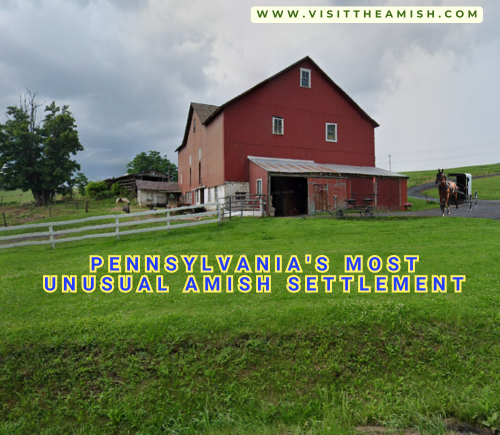The Amish Community of Somerset County, Pennsylvania: A Unique Blend of Tradition and Adaptation
Nestled in the rolling hills of southwestern Pennsylvania, Somerset County is home to one of the oldest and most distinctive Amish communities in North America. Founded in 1772, this settlement stands out for its rich history, unique practices, and enduring presence in the region[1][4]. Despite its age, the Somerset Amish community remains relatively small, with approximately 1,565 Amish residents spread across 11 congregations as of 2024[6].
Historical Significance
The Somerset Amish Settlement holds a special place in Amish history as the second-oldest continuously existing Amish community in North America[1]. It was established by Amish families from the Northkill Amish Settlement in Berks County, Pennsylvania, who were seeking better farmland and a more isolated location to practice their faith[1]. This migration was part of a larger movement that also led to the formation of the well-known Lancaster Amish Settlement.
What makes Somerset County particularly significant in Amish history is its role as a “vanguard” for Amish settlement in the Midwest[1]. Many Amish families from Somerset County went on to establish new communities in Ohio, Indiana, Iowa, and Illinois, effectively spreading the Amish way of life across the American heartland.
Unique Practices
One of the most distinctive features of the Somerset Amish community is their use of meetinghouses for Sunday services[1][6]. This practice sets them apart from nearly all other Old Order Amish groups, who typically hold worship services in members’ homes. The adoption of meetinghouses in Somerset County dates back to the late 1800s, making it a long-standing tradition rather than a recent innovation[8].
The Summit Mills meetinghouse, one of the oldest in the community, was built in 1881 and continues to serve the Amish population today[10]. This unique practice has its roots in local history, with one story suggesting that meetinghouses were built to discourage coal miners from showing up at Amish homes on Sundays seeking free meals[9].
Amish Businesses in Somerset County

Despite its small size, the Somerset Amish community boasts a variety of businesses that cater to both the local population and visitors. Here are some notable Amish-run establishments in the area:
- Peachey’s Country Store
Address: 3319 Rockdale Rd., Meyersdale, PA 15552
This store offers a wide selection of baked goods, including pies, cookies, dessert bars, and homemade chocolate items[8]. - Valley Brook Dry Goods
Address: 6518 Mt. Davis Rd., Meyersdale, PA 15552
This store specializes in fabrics and also carries books, including the community church directory[8]. - Hidden Valley Variety Store & Greenhouse
Address: 169 Hidden Valley Dr., Meyersdale, PA 15552
This business combines a variety store focusing on food items and books with a greenhouse[8]. - Rosy Dawn Greenhouse
Address: 6748 Mt. Davis Rd., Meyersdale, PA 15552
One of several greenhouses in the area, Rosy Dawn is part of a network of Amish-run plant nurseries[8]. - Rustic Woods LLC
While not an address-specific listing, this business offers a large selection of Amish-made furniture in various styles, focusing on custom items and unique home decor[5].
These businesses, along with others in the community, typically observe a specific holiday schedule that visitors should be aware of when planning their trips[8].
Community Characteristics

The Somerset Amish community is characterized by a blend of traditional Pennsylvania Amish and Midwestern Amish influences. This is reflected in the mix of surnames found in the settlement, which include both typically Pennsylvania names like Zook and Beiler, and Midwestern names such as Hochstetler and Slabaugh[8].
The community maintains strong ties to its heritage while adapting to modern necessities. For example, while preserving traditional crafts and agricultural practices, some businesses have embraced limited modern conveniences to serve their customers better.
Visiting the Somerset Amish Community
For those interested in experiencing this unique Amish settlement, it’s important to note that Somerset County is not a tourist-oriented community like Lancaster County. However, visitors can still enjoy authentic Amish goods and services by patronizing local businesses.
When visiting, respect the Amish way of life by refraining from taking photographs of Amish individuals and being mindful of their privacy. The best way to experience the community is through respectful interactions at local businesses and by appreciating the scenic rural landscape that the Amish have helped preserve.
Challenges and Preservation
Like many Amish communities, Somerset County faces challenges in preserving its way of life in the face of modernization and external pressures. However, the community’s long history and unique practices have helped it maintain its identity over the centuries.
The use of meetinghouses, while unusual for Amish groups, has become an integral part of the Somerset Amish identity. This adaptation demonstrates the community’s ability to find innovative solutions to local challenges while still adhering to core Amish values.

Conclusion
The Somerset County Amish settlement stands as a testament to the enduring nature of Amish culture and its ability to adapt while maintaining core traditions. As the second-oldest Amish community in North America, it offers a unique glimpse into Amish history and the evolution of their practices over time. While small in size, its impact on the broader Amish world has been significant, and it continues to be a vibrant and distinctive part of Pennsylvania’s cultural landscape.
For those seeking to understand the diversity within Amish society, Somerset County provides a fascinating case study of how local conditions and historical circumstances can shape a community’s development. As it moves forward into its third century of existence, the Somerset Amish settlement remains a living link to the past and a unique expression of Amish faith and culture in the modern world.
Click-worthy titles:
Citations:
[1] https://en.wikipedia.org/wiki/Somerset_Amish_Settlement
[2] http://www.bakershgc.com
[3] https://extension.usu.edu/employee/files/Orlando2004NACAA.pdf
[4] https://gameo.org/index.php?title=Meyersdale-Springs_Old_Order_Amish_Settlement_%28Somerset_County%2C_Pennsylvania%2C_USA%29
[5] https://somersetcountychamber.com/member-directory/rustic-woods-llc/
[6] https://amishamerica.com/pennsylvania-amish/
[7] https://www.cookshomefurniture.com/by-brand/camish/Camish.html
[8] https://amishamerica.com/somerset-county-pennsylvania/
[9] https://www.amish365.com/part-1-somerset-county-pennsylvania/
[10] https://e-gen.info/?page_id=10986

